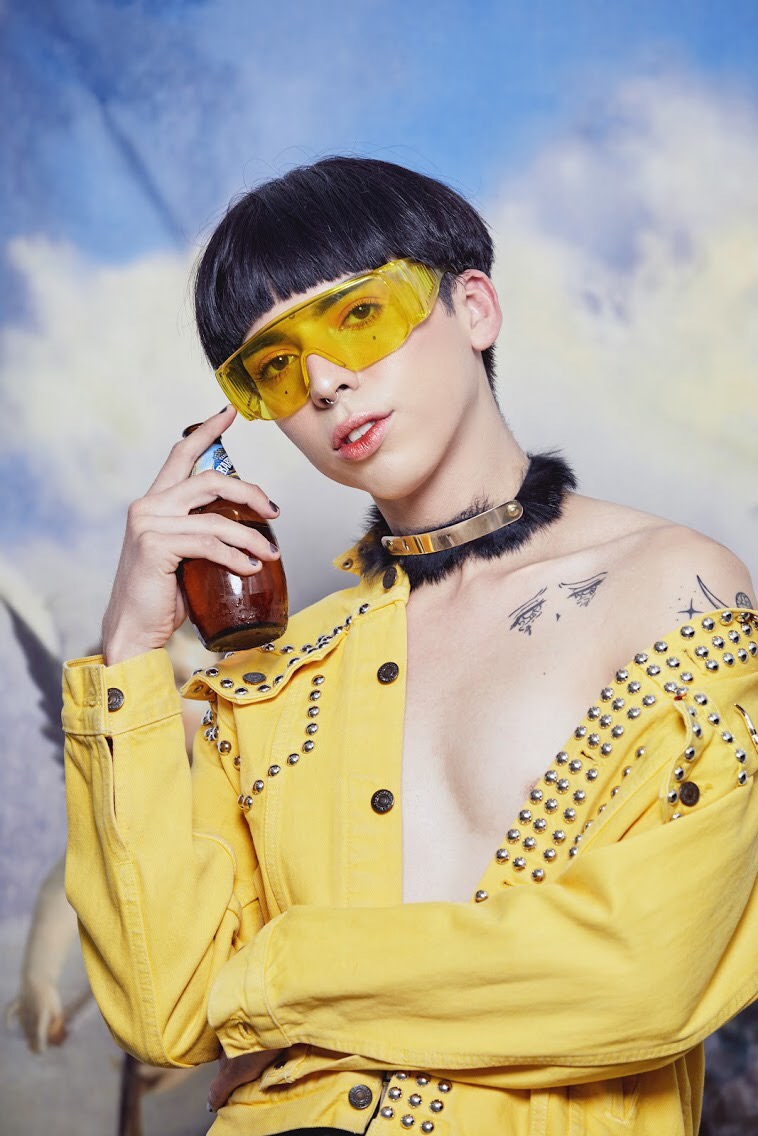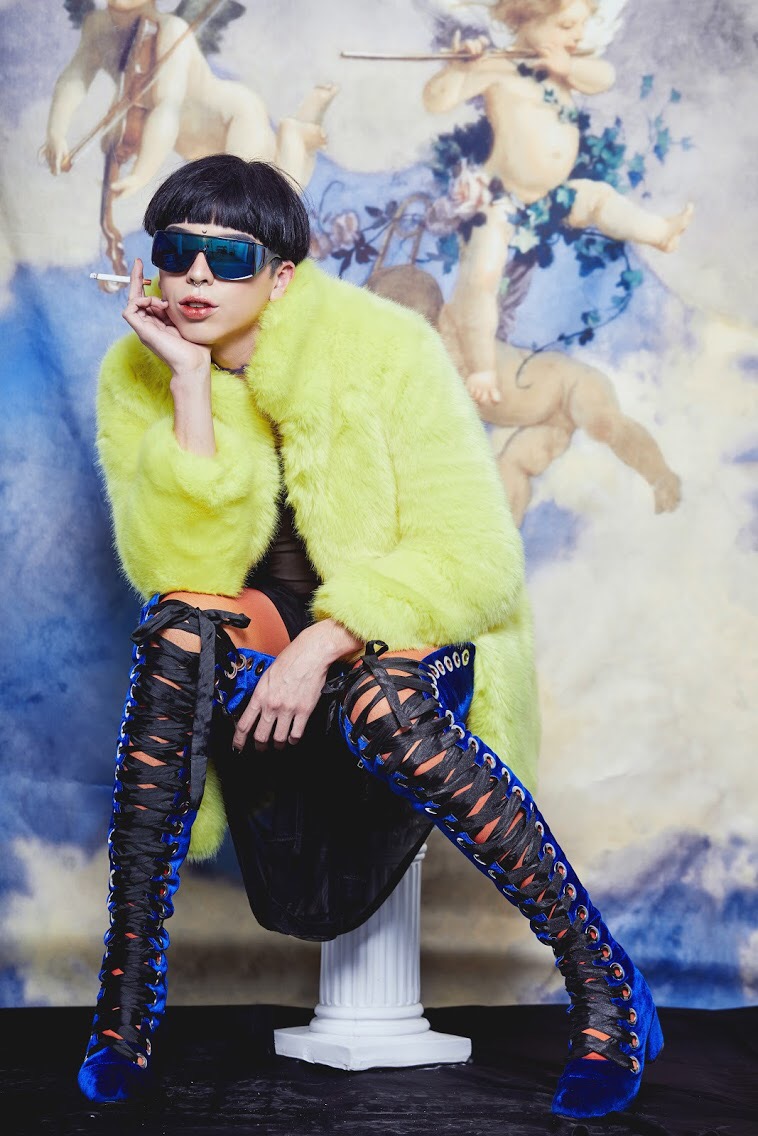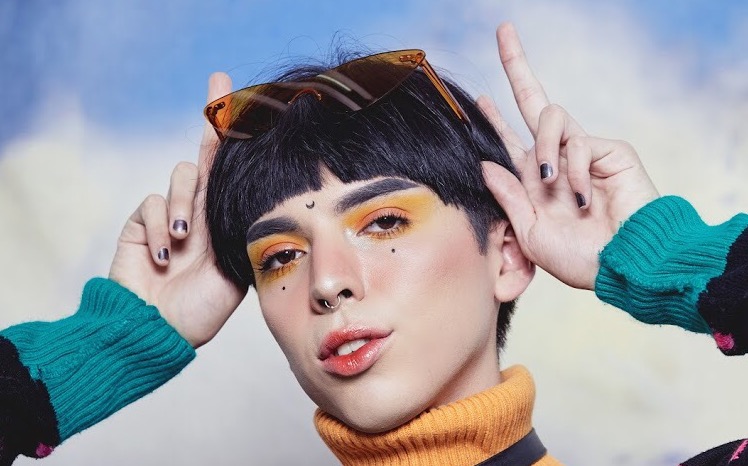In a few short months, 22-year old Mexican viral sensation Sailorfag has become a ubiquitous symbol of the Gen Z zeitgeist, without so much as tousling his perfectly trimmed bowl cut. Precariously balancing a soaring career with a full load of college courses, the young rapper, designer, model and social media personality is redefining expectations of Internet fame with a backbreaking work ethic and an intersectional approach to life.
Originally from Hermosillo, in the northern state of Sonora, Sailorfag relocated to Guadalajara four years ago to pursue a degree in fashion design. Combining his eye for fashion with bubbly charisma, he gained a loyal following on Twitter that rapidly multiplied with a string of highly stylized videos released at the top of the year.
Whether he’s lampooning stereotypical masculinity (“Polo Acartonada”), eviscerating toxic relationships (“Amiga Date Cuenta”), or celebrating the joys of unbridled jotería (“Inventadas y Modernas”), Sailorfag’s humorous approach to social commentary should not go underestimated or dismissed. The young artist has performed at Los Angeles’ Queer Biennal, as well as the city’s official Pride festivities, starred in Vice en Español’s cinematic El ABC del Orgullo short, started an accessory line and opened for RuPaul’s Drag Race fan favorite Adore Delano and neo-perreo standout Ms. Nina at sold-out Mexico City shows.

Despite the landmark year, Sailorfag’s success remains largely unreported, a bitter reminder of the hurdles queer and trans artists face when seeking recognition for their work beyond Pride season. Critics have labeled him as a gimmick, riding the wave of social media celebrity and exploiting queer culture’s increasingly mainstream appeal. But Sailorfag is changing the world with acerbic observations and a reggaeton rhythm. He is the present and future of youth culture: fresh, conscientious, unflinchingly honest and accessible to all.
In a new interview with Remezcla, we spoke with Sailorfag about his meteoric rise, the importance of inclusive language, and why humor and authenticity are powerful tools for social change.
What can you tell us about your upbringing and studies?
I grew up in Hermosillo, which is a really small city, and when it was time for me to start college, I wanted to study fashion design. The University of Guadalajara is the only public university in Mexico that offers a fashion program, so it was cheaper for me to move and pursue my studies than to stay in Hermosillo and pay tuition at a private institution.
Fashion is extremely important to how you present yourself to the world. How would you describe your style?
I’ve been developing my style since high school, when I bought my first pair of platform shoes and began experimenting more when I moved to Guadalajara about four years ago. I really like streetwear – couture not as much. My style is very diverse and influenced by Japanese fashion. Makeup has also become a daily ritual, but like everything, it depends on my mood.
When and why did you start uploading videos to YouTube?
I started releasing videos on YouTube this year, but I actually first gained a following on Twitter, where I uploaded homemade rap videos filmed with my phone and backing beats I’d find online. This year, in January, I released my first two official videos, “Machitos Arwenderos” and “Polo Acartonada,” and everything exploded. Music wasn’t something I thought I wanted to pursue full-time, but the songs were received really well so I decided to keep going. I also want to continue uploading lifestyle and makeup vlogs to my channel, though my schedule is crazy, so I’ve fallen behind.
“I don’t expect everyone to love me, but as long as there are people who identify with my work, why listen to the haters?”
Tell us about the music. How would you define your sound?
I started out rapping because it’s what I was used to doing on Twitter, but I eventually decided to evolve in a more reggaeton direction. I’m mostly influenced by the new wave of women in reggaeton like Ms. Nina, Tomasa del Real, La Goony Chonga, etc. My mixtape is along the lines of trap and rap, but I definitely want my new music to be bouncier, more reggaeton. Tomasa del Real put [“Amiga Date Cuenta”] in a neo-perreo playlist, which was really exciting, so I’m hoping to be embraced by the movement.
Your self-titled debut mixtape dropped back in July. What drove your writing and recording process?
In the beginning, I didn’t know I’d be releasing a full-blown mixtape. I recorded “Machitos Arwenderos” and “Polo Acartonada” in December and dropped them in January. That same month, I agreed to a booking in Monterrey, which I was dubious about since I didn’t feel comfortable showing up with just two tracks, so I came to Mexico City and recorded another song with David, my producer. As the bookings kept rolling in, I kept recording until eventually we decided to release a full tape.
Your music humorously dissects masculinity, toxic relationships, and homophobia, which are rare topics in the urbano genre. What brought you to those conversations?
I used to call out a lot of stuff on Twitter, but I soon realized that the videos where I was rapping were more fun and reached way more people. Music is a way to spread a message on a larger and more entertaining scale, and I think my fans have engaged with it. I also don’t like taking myself too seriously. I’m not claiming to be a super serious rapper or artist, but I like using the way I express myself naturally in my lyrics.

What prompted your decision to write in inclusive language?
Language is constantly evolving and I’ve always felt conflicted about the way Spanish pluralizes things in masculine. As I became involved in circles where gender identity was a major subject, I learned more about inclusive language and began using it in my music. Slowly but surely, inclusive language is becoming more powerful and maybe in a not so distant future it will come more naturally to people. Besides, most of the people who complain about what the Real Academia Española deems as correct can’t even punctuate a sentence.
Do you ever struggle with audiences or critics that don’t take your music seriously?
Oh yeah. There are plenty of people who think I’m a joke and that I shouldn’t be taken seriously because of the language I use. But I honestly don’t care. At first, the comments made me question myself, but I’m now at a point where I don’t give a fuck. I don’t expect everyone to love me, but as long as there are people who identify with my work, why listen to the haters?







